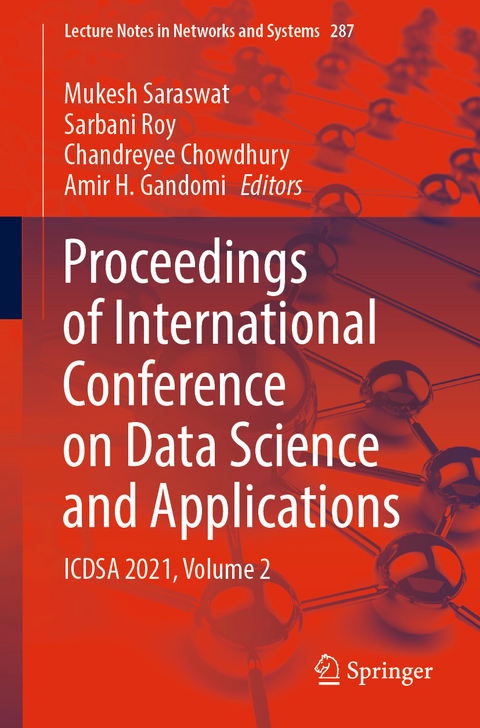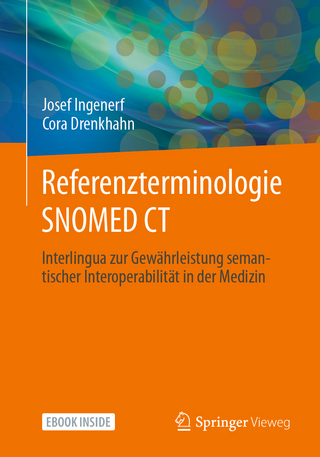
Proceedings of International Conference on Data Science and Applications
Springer Verlag, Singapore
978-981-16-5347-6 (ISBN)
Dr. Mukesh Saraswat is Associate Professor at Jaypee Institute of Information Technology, Noida, India. Dr. Saraswat has obtained his Ph.D. in Computer Science and Engineering from ABV-IIITM Gwalior, India. He has more than 18 years of teaching and research experience. He has guided 02 Ph.D. students and more than 50 M.Tech. and B.Tech. dissertations and is presently guiding 05 Ph.D. students. He has published more than 40 journal and conference papers in the area of image processing, pattern recognition, data mining, and soft computing. He was the part of successfully completed DRDE-funded project on image analysis and is currently running two projects funded by SERB-DST (New Delhi) on Histopathological Image Analysis and Collaborative Research Scheme (CRS), under TEQIP III (RTU-ATU) on Smile. He has been an active member of many organizing committees of various conferences and workshops. He was also Guest Editor of the journal of Swarm Intelligence. He is Active Member of IEEE, ACM, CSI Professional Bodies. His research areas include image processing, pattern recognition, mining, and soft computing. Sarbani Roy is Professor in the Department of Computer Science and Engineering, Jadavpur University, Kolkata, India. She received her Ph.D. degree in Engineering from Jadavpur University in 2008. She was awarded Fulbright-Nehru Senior Research Fellowship in 2013–2014, and she joined the research program at University of North Carolina, Charlotte, USA. Her research interests include cloud computing, wireless sensor networks, IoT, social network analysis, and data science. She has published around 130 research papers in international journals, conference proceedings, and book chapters. She has served on the technical program committees of various international conferences and has organized many international conferences and workshops. She is Senior Member of IEEE. Chandreyee Chowdhury is Associate Professor in the Department of Computer Science and Engineering at Jadavpur University, India. She has received M.E. in Computer Science and Engineering in 2005 and Ph.D. in 2013 from Jadavpur University. Her research interests include IoT in health care, indoor localization, and human activity recognition. She was awarded Post Doctoral Fellowship by Erusmus Mundus in 2014 to carry out research work at Northumbria University, UK. She has served as the technical program committee members of many international conferences. She has published around 90 papers in reputed journals, book chapters, and international peer-reviewed conferences. She is Member of IEEE and IEEE Computer Society. Amir H. Gandomi is Professor of Data Science and ARC Discovery Early Career Research Award (DECRA) Fellow at the Faculty of Engineering and Information Technology, University of Technology Sydney. Prior to joining UTS, Prof. Gandomi was Assistant Professor at the School of Business, Stevens Institute of Technology, USA, and distinguished Research Fellow in BEACON center, Michigan State University, USA. Prof. Gandomi has published over two hundred journal papers and seven books which collectively have been cited more than 17,000 times (H-index = 60). He has been named as one of the most influential scientific mind and highly cited researcher (top 0.1%) for four consecutive years, 2017 to 2020. He also ranked 18th in GP bibliography among more than 12,000 researchers. He has served as an associate editor, editor and guest editor in several prestigious journals such as AE of SWEVO, IEEE TBD, and IEEE IoTJ. Prof Gandomi is active in delivering keynotes and invited talks. His research interests are global optimization and (big) data analytics using machine learning and evolutionary computations in particular.
Chapter 1. Feature Selection using Multiple Ranks with Majority Vote Based Relative Aggregate Scoring Model for Parkinson Dataset.- Chapter 2. Performance Enhancement of Fractional PI^λ D^μ Controllers using Modified Grey Wolf Optimization.- Chapter 3. Evaluation of Intent Classification Models on Frequently Asked Railway Queries.- Chapter 4. On Cost Analysis of New Crossbar Interconnection Network.- Chapter 5. A Review on Pattern Recognition based Retinal blood vessels extraction technique to detect Diabetic Retinopathy (DR).- Chapter 6. Multiband Reconfigurable Antenna Design with Frequency, Polarization and Pattern diversities.- Chapter 7. Issues and Framework of Rules for Resolving Anaphora in Marathi Text.- Chapter 8. Investigation on Customer Churn Prediction using Machine Learning Techniques.- Chapter 9. Key object classification for Activity Recognition in tennis using cognitive approach in Mask RCNN.- Chapter 10. BioGamal Privacy Preserving Public Auditing for Cloud Computing.- Chapter 11. Analysis of Intelligent Fuzzy Logic MPPT for Hybrid PV-Wind Energy System.- Chapter 12. Fusion Based Feature Extraction Approach for Recognition of Handwritten Devnagari Numerals.- Chapter 13. Analysis of independence and Clustering pattern of students in adopting MOOCs.- Chapter 14. Enhancing Monitoring in Online Exams using Artificial Intelligence.- Chapter 15. Emergent use of AI and Social Media for Disaster Management.
| Erscheinungsdatum | 29.11.2021 |
|---|---|
| Reihe/Serie | Lecture Notes in Networks and Systems ; 287 |
| Zusatzinfo | 260 Illustrations, color; 93 Illustrations, black and white; XXIII, 799 p. 353 illus., 260 illus. in color. |
| Verlagsort | Singapore |
| Sprache | englisch |
| Maße | 155 x 235 mm |
| Themenwelt | Informatik ► Theorie / Studium ► Algorithmen |
| Informatik ► Theorie / Studium ► Künstliche Intelligenz / Robotik | |
| Mathematik / Informatik ► Mathematik | |
| Technik | |
| Schlagworte | Data Mining • Data Science applications • Data Science Challenges • ICDSA 2021 • ICDSA Proceedings • machine learning • Models and Algorithms |
| ISBN-10 | 981-16-5347-X / 981165347X |
| ISBN-13 | 978-981-16-5347-6 / 9789811653476 |
| Zustand | Neuware |
| Haben Sie eine Frage zum Produkt? |
aus dem Bereich


